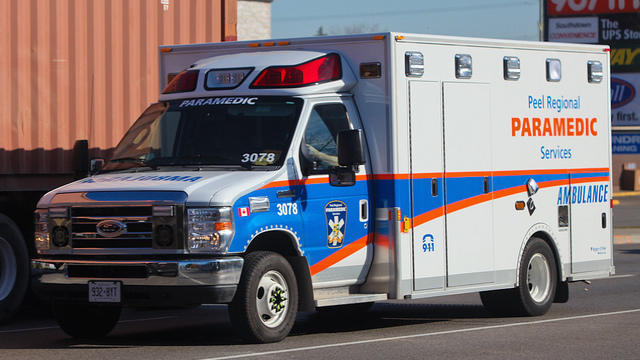Paramedic response times slowed in Mississauga, Brampton because of COVID-19
Published October 14, 2021 at 1:32 pm

Peel Region paramedics were 32 seconds slower when responding to critically ill patients last year, due in part to challenges related to the coronavirus pandemic.
And while most medical calls managed to stay within levels set by both Regional Council and the province, a new report shows critical call response times for this year are still “over target” or slower in 2021.
Last year, council approved a target time of eight minutes for paramedics to respond to emergency calls where a patient was “critically ill.”
According to a report from the Region’s Commissioner of Health Services, response times for critical calls were “32 seconds over target” in 2020, and “23 seconds over target” between January and August of this year.
The report found the pandemic had impacted response times for a number reasons, including inconsistency in call volume, “paramedic absences,” and “offload delay” at Region hospitals.
“During the height of the third wave, every call was related to COVID, so heightened precautions and anxieties have led to wellness decline where more paramedic absences are occurring,” the report reads.
Response times are measured “from when the paramedic is notified to when they complete their initial assessment of the patient,” and the eight-minute target for critical calls is set by the Ministry of Health and Long-Term Care.
And even with the Region forecasting call volumes moving closer to 2019 pre-COVID levels, the report stated there is “uncertainty” with how call volume will be impacted in 2022 as a result of COVID.”
On Thursday, Region council approved paramedic response times for 2022 with no changes to the current response times.
But to help with demand, the Region will be requesting contingency staffing resources funded by the rate stabilization reserve to “allow flexibility in adding additional staffed ambulances in the system” during peak times, according to the report.
The report stated contingency resources would have “no net impact on the 2022 Budget,” and still provide time for staff to evaluate call volumes and their related impacts in 2022.
Health Services may still bring forward “a more comprehensive request for staffing needs” in 2023 in order to manage response times.
INsauga's Editorial Standards and Policies



